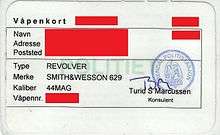Firearms license
A firearms license (also known as a gun license; or licence in British English) is a license or permit issued by a government authority (typically by the police) of a nation, that allows the licensee to buy, own, possess, or carry a firearm, often subject to a number of conditions or restrictions, especially with regard to storage requirements or the completion of a firearms safety course, as well as background checks, etc. Firearms licenses are not required in all jurisdictions. Additionally, some countries or states may require by law a "permit-to-purchase" in order to buy handguns or firearms.[1]

The permit or license scope varies according to what firearm(s) or activity(s) it allows the holder to legally do with the firearm. Some jurisdictions may require a firearm license to own a firearm, to engage in hunting, target shooting or collecting, or to carry a concealed firearm, or operate a business (such as being a gun dealer or a gunsmith). Some jurisdictions may require separate licenses for rifles, shotguns or handguns.
The requirement to have a firearm license, is usually in addition to a requirement for firearm registration. For example, in Australia, firearms must be registered by serial number to the owner, who holds a firearm licence.
Countries with firearms licensing
- Australia
- Brazil
- Canada
- Czech Republic
- Denmark
- Finland
- France (only northern France)
- Germany
- India
- Ireland
- Israel
- Italy
- New Zealand
- Norway
- Pakistan
- Paraguay
- Perú
- Philippines
- Romania
- Slovakia
- South Africa
- Spain
- Sweden
- United Kingdom
- United States of America (for some states and/or municipalities)
- Uruguay
- Zimbabwe
References
- "What works to reduce gun deaths". The Economist. Retrieved 2018-05-21.